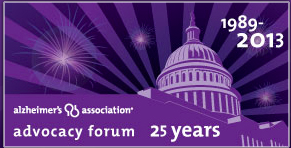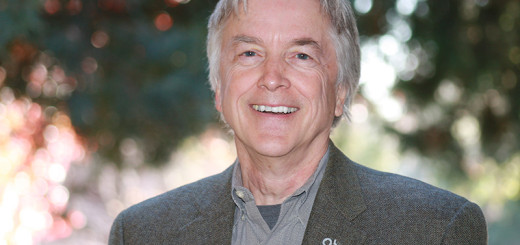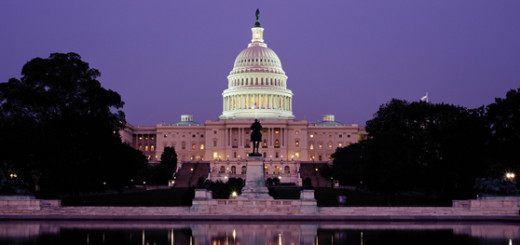25 Years of Making our Voice Heard: Let 2013 be the Year of Real Change
 On April 22, volunteers from around the country will convene in Washington, D.C. for the 25th Alzheimer’s Association Advocacy Forum — the nation’s largest Alzheimer’s policy event. Since 1989, dedicated Alzheimer’s advocates have met annually to share their personal experiences, learn about legislative initiatives, celebrate policy efforts and urge elected officials to make Alzheimer’s disease a national priority. This year a record number of advocates are slated to attend. As the Association’s new volunteer ambassador to the office of Senator Dianne Feinstein, I will attend the Forum for the first time.
On April 22, volunteers from around the country will convene in Washington, D.C. for the 25th Alzheimer’s Association Advocacy Forum — the nation’s largest Alzheimer’s policy event. Since 1989, dedicated Alzheimer’s advocates have met annually to share their personal experiences, learn about legislative initiatives, celebrate policy efforts and urge elected officials to make Alzheimer’s disease a national priority. This year a record number of advocates are slated to attend. As the Association’s new volunteer ambassador to the office of Senator Dianne Feinstein, I will attend the Forum for the first time.
Expectations are high that the 25th Forum will make a meaningful difference in the fight against Alzheimer’s, and there’s good reason for optimism. Recent advocacy efforts have produced important results, chief among them the passage of the National Alzheimer’s Project Act and the release of the first-ever National Alzheimer’s Plan. The fight against Alzheimer’s was in the national spotlight earlier this year, when President Obama mentioned Alzheimer’s disease in his State of the Union address, underscoring the critical need for medical research to address Alzheimer’s and other dementias.
Raising awareness of the disease continues to be important. For example, too many people still don’t know that:
- Alzheimer’s isn’t merely inconvenient memory loss — it’s the sixth leading cause of death in America. People with Alzheimer’s don’t just forget their children’s names, they forget how to care for themselves, and in the latest stages of the disease, they even forget how to eat and drink. In 2013, some 85,000 Americans will die of Alzheimer’s disease.
- Alzheimer’s is the only disease in the top 10 causes of death without a way to prevent it, cure it or even slow its progression.
- Alzheimer’s threatens to overwhelm our health care system and our economy, costing our nation an estimated $203 billion annually, with government programs like Medicare and Medicaid shouldering over 66% of the tab. Left unchecked, those costs are expected to soar to $1.2 trillion (in today’s dollars) in 2050.
- Alzheimer’s takes a devastating toll not just on people with the disease, but on their families, friends and caregivers, who in 2012 provided 17.5 billion hours of unpaid care valued at more than $216 billion.
The Alzheimer’s Association, in inviting advocates to the 2013 Forum, acknowledged recent successes, saying, “We know that a common goal can, and will, create change, but there is much more to be done.”
I emphatically agree. My hope is that, looking back 20 years from today, we will be able to say that this Forum marked the pivot point in the struggle against Alzheimer’s — that 2013 was the year Congress, policymakers and citizens across the nation stood up and said: Alzheimer’s disease cannot be permitted to ravage our people and bankrupt our society; starting now, addressing Alzheimer’s is a top national priority.
This is not an impossible dream. Though this will be my first Alzheimer’s Association Forum, it is not my first health advocacy effort. In 1992, following treatment for breast cancer at age 35, I was among a group of Bay Area women who were alarmed at the accelerating rate at which women were being diagnosed with and dying from breast cancer. Borrowing a page from the AIDS advocacy movement, we decided to take action, and organizations such as Breast Cancer Action and the Breast Cancer Fund were formed. Similar groups sprang up in New York, Washington, DC and across the nation. Our goal was to raise awareness and incite a movement that would lead to the eradication of the disease. Our message, like that of AIDS activists engaged in a similar struggle, was: this disease is an epidemic that cannot be ignored; it must be stopped now.
Today, people are still being diagnosed with breast cancer and HIV/AIDS at unacceptable rates, and challenges remain in the areas of prevention and patient care. But through tenacious advocacy, remarkable progress has been made in reversing the trends that had been so terrifying. For example, between 2000 and 2010, deaths from breast cancer decreased 2 per cent, and deaths from HIV/AIDS decreased 23 per cent. By comparison, during the same period deaths from Alzheimer’s disease increased 68 per cent!
When we meet with members of Congress on the Hill later this month, we’ll share stories of how Alzheimer’s has affected us and our loved ones. This is especially important because, to a greater extent than other afflictions, Alzheimer’s robs patients of the ability to advocate for themselves.
But now, more than ever, we must turn those stories into action. Let’s demand that Congress make combatting Alzheimer’s disease an immediate priority by allocating adequate funding for research, patient care and caregiver support. (Approving the President’s 2013 budget request for $80 million for Alzheimer’s research and $20 million for care and support is a good place to start.)
Together, let’s act now to galvanize the national will, so we can look back on 2013 as the pivotal year in the struggle to free our nation from the grip of Alzheimer’s disease and reclaim our future. In 2013, let’s do more than make a difference. Let’s make real change.

















